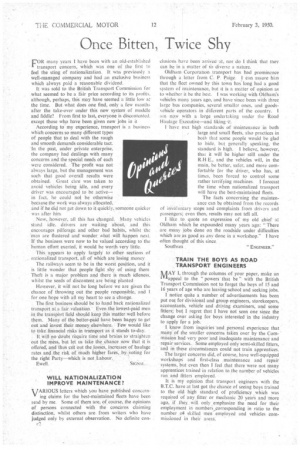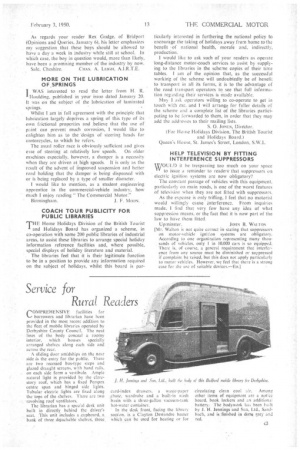Once Bitten, Twice Shy
Page 40

Page 41

If you've noticed an error in this article please click here to report it so we can fix it.
OR many years I have been with an old-established ." transport concern, which was one of the first to feel the sting of nationalization. It was previously a well-managed company and had an exclusive business which always paid a reasonable dividend.
It was sold to the British Transport Commission for what seemed to be a fair price according to its profits, although, perhaps, this may have seemed a little low at the time. But what does one find, only a few months after the take-over under this new system of muddle and fiddle? From first to lastv everyone is discontented. except those who have been given new jobs in it According to my experience, transport is a business which concerns so many different types.
of people that to deal with the rough and smooth demands considerable tact.
In the past, under private enterprise,
the company had dealings with many concerns and the special needs of each
were considered. The profit was not always large, but the management was such that good overall results were obtained. Great cure was taken to
avoid vehicles being idle, and every driver was encouraged to he active—
in fact, he could not be otherwise because the work was always allocated, and if he did not get down to it quickly, someone quicker was after him
Now, however, all this has changed. Many vehicles stand idle. drivers are waiting about, and this encourages pilferage and other bad habits; whilst the /men are flustered and wonder. what Will happen next. If the business were now to be valued according to the human effort exerted, it would be worth very.little.
This appears to apply largely to other sections of nationalized transport, all of which are .losing money
The railways seem to be in the worst position, and it is little wonder that people fight .shy of using them Theft is a major problem and there is much idleneSs. whilst the seeds of discontent. are being plante.d However, it will not be long before we are. given the chance of throwing out the people responsible, and I for one hope with all my heart to see a change.
The-first business Should be to -hand back nationalized transport at a fair valuation.Even the lowest -paid men M the transport field should keen this matter well before them. . Many of the better-paid have been happyto get out and invest their. money. elsewhere. Few would like . to take financial risks in transport as it stands to thy . It will no 'doubt require time and brains' to straighten out the mess, but let us take the .chance now that it is offered, and thus cut Out the losses, increases of haulage rates and the risk of Much higher .fares, by .voting for the right Party—which is not Labour.
Ewell. SIGNAL .
WILL NATIONALIZATION IMPROVE MAINTENANCE?
VARIOUS letters which you have published concern. : v ing claims for the best-maintained fleets have been tead by me, Some of them are of course, the opinions of persons connected with the concerns claiming distinction, whilst others are from writers who have judged only by external observation. No definite con
e^ elusions have been arrived at, nor do I think that they can be in a matter. of SO diverse a nature.
Oldham Corporation. transport has had prominence
through a letter from C. P. Paige. can assure hini that the fleet owned by this town has long had a good system of maintenance, but it is a matter of opinion as to whether it be the best. I was working witb.Oldharri7s vehicles many years ago, and have since been with three. large bus companies, several smaller ones, and goodsvehicle operators in different parts of the country. ant now with a large undertaking under the ROad Haulage Executive—and liking it.
I have met high standards of maintenance in both large and small fleets, also practices in both that some people would be glad to hide, but generally speaking, the standard is high. I believe, however, that it will be higher still under the R.H E., and the vehicles will, in the main, be better, safer, and more comfortable for the driver, who has, at times, been forced to control some rather terrifying machines. I forecast the time when nationalized transport will have the best-maintained fleets. The facts concerning the' maintenance can be obtained from the records of involuntary stops'. and complaints from drivers and
passengers; even then, results may not tell all. .
I like to quote an expression of My old chief at Oldham which he expounded many years .ago: "There are many jobs done on the roadside under difficulties which areas good as any done in a workshop." have often thought of this since.
Southsea " ENGINEER."
TRAIN THE BOYS AS ROAD TRANSPORT ENGINEERS NAAY I, through the columns of. your paper, make an iviappeal to the "power that be " with the British Transport Commission not to forget the boys of 15 and 16 years of age who are leaving school and seeking jobs.
I notice quite a number of advertisements has been put out for divisional and group engineers, storekeepers, accountants, vehicle and driving examiners, and some fitters; but I regret that I have not seen one since the change over asking for boys interested in the industry to apply for a job.
• I know from inquiries and personal experience that many of the smaller concerns taken over by the Commission had very poor and inadequate maintenance and repair services. Some employed only semi-skilled fitters, and in these circumstances could not train apprentices. The larger concerns did, of course, have well-equipped workshops and first-class .maintenance and repair systems, but even then I feel that there were not many apprentices trained in relation to the number of vehicles run and fitters employed.
It is my opinion that transport engineers with the B.T.C. have at last got the chance of seeing boys trained to the old high standard of proficiency which was required of any fitter or mechanic 20 years and more ago, if they will only emphasize the need for their employment in numbers„corresponding in ratio to the number 06 skilled men employed and vehicles commissioned in their mem:
As regards your reader Rex Gudge. of Bridport (Opinions and Queries, January 6), his letter emphasizes my suggestion; that these boys should be allowed to have a day a week in industry while still at school. In which case, the boy in question would, more than likely, have been a promising member of the industry by now.
Sale, Cheshire.C'.1a,,ks. A. LEIGH, A.I.R.T.E,
• MORE ON THE LUBRICATION OF ,SPRINGS
I WAS interested to read the letter from H. R.. Houlding, published in your issue dated January 20. If Was on the .subject of the lubrication of laminated springs.
Whilst I arn in full agreement with the principle that lubrication largely deprives a spring of this type of its own frictional properties and .believe that the use of paint can prevent much corrosion, I would like to enlighten him as to the 'design of steering heads for motorcycles, to which he refers, The usual roller race is obviously .sufficient and gives
ease of steering' at relatively low' speeds. On older machines especially, however, a 'damper is a necessity when they arc driVen at high speeds. If is only as the result of the advent of improved suspension and better road holding that the damper is being dispensed with or is being replaced by a type of smaller diameter, 1 would like to mention, as a student . engineering apprentice in the commercial-vehicle industry, how rntich I enjoy reading "The Commercial Motor."
Birmingham. J. F. MOON.
COACH TOUR PUBLICITY FOR PUBLIC LIBRARIES
TFIE Home Holidays Division of the British Tourist '4" and Holidays Board has organized a scheme, in co-operation with some 200 public libraries of industrial areas, to assist these libraries to arrange special holiday information reference facilities and, where possible, special displays of holiday literature and material. The libraries feel that it is their legitimate function to be in a position to provide any information required on the subject of holidays, whilst this board is par
ticularly interested in furthering the national policy to encourage the taking of holidays away from home to the benefit of national health-, morale and, indirectly, production.
I would like to ask such of your readers as operate long-distance motor:coach services to assist by supplying to the libraries in the scheme copies of their time tables, 1 am of the :opinion that, as the successful working of the scheme will undoubtedly be of benefit to transport in all its forms,it is to the advantage of the road transport operators to see that full information regirding their services is made available, May . ask operators willing to 'co-operate to get in touch with me. and I will arrange for fuller details of the scheme and a complete list of the libraries participating to be forwarded to them, in order that they may add the addresses to their mailing lists.
S. 0. JONES, Direetor.
For Home Holidays Division, The British Tourist and Holidays Board,/ Queen's House, St. James's Street, London, S.W.I.
HELP TELEVISION BY FITTING INTERFERENCE SUPPRESSORS
WOULD it he trespassing too much on your space 'v to issue a reminder to readerSthat suppressors on electric ignition systems are now obligatory?
The constant passage of vehicles with this equipment. particularly on main roads, is one of the worst features of television when they are not fitted with suppressors.
As the expense is only trifling, I feel that no motorist would willingli cause interference. From inquiries made. I find that very few have any idea of what suppression means, or the fact that it is 'now part of the law to have them fitted.
Upminster. JouN B. WAL.ToN
[Mr. Walton is not quite correct in stating that suppreSsors on motor-vehicle ignition systems are obligatory. According to one organization representing many thou _ sands of vehicles, only 1 in. 10,000 cars is so equipped. There is, of course, a general requirement that interference from any source must be diminished or suppressed if complaint be raised, but this does not apply particularly to motor vehicles. However, we feel that there is a strong case for !he use of suitable devices.—En..1




























































































